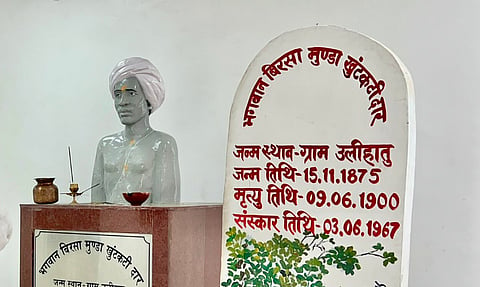
Ranchi- Roughly 66 kilometers from Ranchi, the capital of Jharkhand, lies a small village called Ulihatu in Khunti district, surrounded by forests and hills. It was in this very village, exactly 150 years ago, that Birsa Munda was born—a revolutionary who sounded the clarion call for a movement that led a significant region of Jharkhand to declare an end to British rule and embrace ‘Abua Raj,’ or self-rule. Today, on Birsa Munda’s birth anniversary, the entire nation is celebrating ‘Tribal Pride Day.’ This day marks the foundation day of Jharkhand.
This year also marks the beginning of the ‘Tribal Pride Year,’ which will conclude on November 15, 2025, commemorating Birsa Munda’s legacy.
Born on November 15, 1875, Birsa Munda’s revolutionary movement is remembered as ‘Ulgulan’ in the tribal language of Jharkhand. In 1899, during the Ulgulan uprising, thousands joined him, voicing in unison in their native language, “Diku Raij Tuntu Jna-Abua Raij Ete Jna,” which translates to “The rule of outsiders has ended, and our own rule begins.”
Known reverently as Bhagwan Birsa Munda, he is remembered as an extraordinary warrior. Few are aware that, deeply shaken by his Ulgulan, the British authorities committed a massacre on the Dombari Buru hill in Khunti district, a tragedy even larger than Jallianwala Bagh. Vivek Aryan, a researcher at the Tribal Research Institute in Ranchi who studies the role of Birsa Munda and other tribal heroes in the freedom struggle, says, “Birsa Munda was just a school student when he realized that British rule was destroying the traditional structure of tribal society. He raised his voice in protest, and in 1890, he was expelled from school. Afterward, he began traveling from village to village, educating the tribal community about their rights. When tribal chieftains united under his leadership, British police arrested him on August 24, 1895, in Chalkad village.”
According to historical documents, on November 19, 1895, he was sentenced to two years of hard labor under Section 505 of the Indian Penal Code. Upon his release from prison on November 30, 1897, the Munda tribals in Khunti and surrounding areas once again rallied against British rule. On December 24, 1899, Birsa Munda declared the beginning of Ulgulan. The proclamation stated that they had the right to “water, forest, and land” as it was their own rule.
By January 1900, the flames of Ulgulan had spread across the entire Munda region. On January 9, 1900, thousands of Mundas, armed with bows, arrows, and traditional weapons, gathered on Dombari Buru hill. British spies had already alerted the British forces of the gathering. The British police and military surrounded the hill, and a fierce battle ensued. Thousands of tribals, led by Birsa, fought valiantly, even as the British fired guns and cannons, while Birsa Munda and his followers responded with arrows. In the battle at Dombari Buru, thousands of tribals were brutally killed.
According to a report published in The Statesman on January 25, 1900, around 400 people lost their lives in this battle. It is said that the hill was stained red with the blood of those slain, and the nearby Tajna River turned crimson with the blood of the martyrs. Although the British emerged victorious in this battle, they could not capture the rebel leader Birsa Munda. However, on the night of February 3, 1900, he was finally arrested by British police while he was sleeping in the dense forests of Chaibasa. He was taken to Ranchi via Khunti. His trial was held in secret, overseen by Magistrate W. S. Kuttus.
Although Barrister Jackson was appointed as his defense lawyer, it was merely a formality. Birsa Munda was imprisoned in Ranchi jail, where he endured severe torture. On June 1, the British authorities spread rumors of him contracting cholera, and on the morning of June 9, he breathed his last within the jail. His body was discarded near the current-day Distillery Bridge in Ranchi, where his final resting place now stands. The Ranchi jail where he passed away has been developed into the Birsa Munda Memorial Museum.
Disclaimer: This article is sourced from the IANS News Feed, which holds full responsibility for its content.
You can also join our WhatsApp group to get premium and selected news of The Mooknayak on WhatsApp. Click here to join the WhatsApp group.